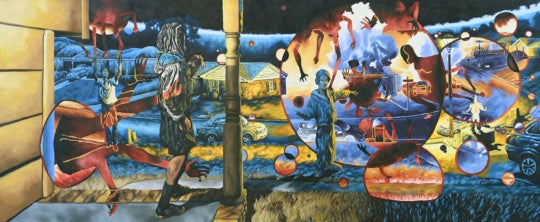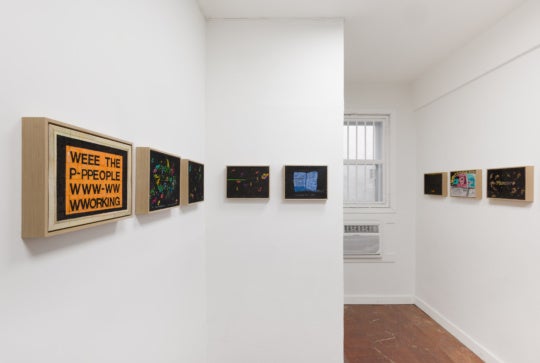
Based in Virginia, Jeannette Walls is the author of the memoir The Glass Castle, a New York Times bestseller, and the novel Half Broke Horses, based on her grandmother’s life. Her latest novel, The Silver Star, is set in the 1970s and follows the intrepid sisters—15-year-old Liz and 12-year-old Bean—as they come-of-age. It’s a heartbreaking tale that explores limitations set by both society and family, as well as the ways in which courage and hope can still soar. I recently spoke to the author by phone.
Soniah Kamal: You write both memoir and fiction. What are the challenges of switching between these mediums?
Jeannette Walls: They are both challenging in their own way. Nonfiction asks “What happened? What really happened?” And in fiction, the question is “What would happen in this situation? What is logical to this character’s personality?”
SK: Where did the idea for The Silver Star come from?
JW: I’m fascinated by the dynamics between siblings and how it plays out in a dysfunctional family, where the elder siblings take on the responsibilities of a parent so that the younger sibling can have a childhood. Also, every sibling who has ever compared notes from their childhood knows that one sibling’s fondest memories can be another’s most bitter, that a beloved parent to one can be a cruel monster to another.
SK: And the title?
JW: After telling my personal story in The Glass Castle, I’ve been blessed by people sharing their own childhood stories and, inevitably, I hear astonishing stories about oldest children who go to work and protect their younger siblings. It’s an incredible heroism, an act of sacrifice. But these acts of everyday sacrifice often get taken for granted or get overlooked, and so our everyday heroes, the children who take care of their other siblings, the moms who work double shifts at the cotton mill, don’t get recognized. In the novel, a silver star is one such recognition. An early title was Tender Shoots, alluding to a biblical passage in the novel regarding trees and how they can be chopped down, but their tender shoots will not cease. I thought that was a great metaphor for resilience!
SK: Bean and Liz often end up parenting themselves and also their mother. Where do you think their resilience and maturity comes from?
JW: From being forced to take care of themselves. Very often, in cases where the parents are not present physically, emotionally or mentally, the children grow up really quickly. I saw it in my own household. My younger brother, when he was 7 or 8, got tired of hearing, “Oh you’re just a Little Man, aren’t you?” That said, these days there seems to be an emphasis on helicopter-parenting, so perhaps a balance between the two types of parenting is best, so that kids grow up neither overwhelmed with responsibilities nor overly dependent.
SK: Your novel also addresses the pull between the past and present, in particular in the character Tinsley, the girls’ maternal uncle.
JW: Each of the characters in this novel are lying to themselves at some level in order to live with themselves, and Tinsley Holladay is definitely stuck in some version of the 1950s, if not even further back, when the Holladays ruled the town. So he’s a Southerner who will rationalize past evils and say things like, “that system worked in some ways.”
SK: I am from Pakistan and can recall elders saying, “There were some things the British did right,” or “We were much better off under the British.”
JW: It’s an emotional reaction and not an intellectual one. I’m very interested in exploring how an otherwise intelligent person tries to intellectualize something that can’t be rationalized and, on some level, believes it. I think eventually reality starts creeping in and people like this realize the folly of their beliefs.
SK: Or society changes to reflect that reality. What does being Southern mean to you?
JW: I love the South. I love living in the South, though I live in Virginia, which some Southerners may not consider the South. But I do live close to the Mason-Dixon line and feel very much a part of the South. The South produces so much great literature, and the reason is its rich history of contradictions, the love and the hate and freedom and confinement. A friend of mine says that the difference between the North and the South is that in the North you lock your crazy aunt up in the attic and in the South you put a fancy hat on her and put her in the parlor.
SK: All your books explore class and I was interested in the role of downward mobility in The Silver Star, for instance, the wealthy Charlotte, the girls’ mother, marrying a mill worker. Usually the social conversation is all about upward mobility.
JW: Americans tend to deny the existence of class, but of course it exists, although class boundaries are certainly more fluid than in some countries. There is new money and old money, and there’s white trash and the blue bloods. Charlotte Holladay is self-aware enough to know how crazy this system is but she also realizes that her background has afforded her music lessons, traveling, and being able to live on a trust fund, so she’s someone who is living in both realities. In the Holladays’ case, the family money is gone but Tinsley, for instance, is still clinging to the idea of being superior, and it’s weird and tragic because he is literally a poor snob.
SK: That’s a great phrase, “poor snob.” Do you think there’s a place for socially engaged fiction in the U.S.?
JW: Some of the most powerful fiction has been socially engaged, for instance Harriet Beecher Stowe’s Uncle Tom’s Cabin and Upton Sinclair’s The Jungle. These novels opened people’s eyes to social horrors and were instrumental in changing legislation.
SK: These novels were written a while back. Would you say the role of fiction has changed?
JW: These novels were written in a very progressive era, when people were interested in opening eyes. However, I’m an optimist and like to think that we’re entering another truly progressive era in which we’re rethinking some of the things we thought we knew and some of the assumptions that we’ve clung to for so long. The Silver Star is set in the ’70s, a time period I lived through. I often hear people remark, “Times used to be simpler. Back in the ’70s, everything used to be so much easier.” The fact is, things have always been difficult and I believe that things are, in some ways, much better than they used to be. While we do have a long way to go on issues like racism and feminism and sexuality, we can now talk about these things in ways we didn’t used to be able to.
SK: I agree. However, at times, it does seem as if the world is falling apart faster because we have access to so much news from everywhere, and bad-news fatigue tends to be on the rise.
JW: I believe that everything in life is both a blessing and a curse. Increased access to information can cause anxiety, but it can also be such a blessing because increased information means people can become informed if they want to, and become more sensitive to people who live lives unlike their own. It used to be much easier to lead an isolated and insular life. Between being aware and exhausted by all the horrors in the world or being oblivious and ignorant of it, I would choose the former. If you can find humanity in people, even if they are hurting you, then that is your salvation. If you can find the good in a bad situation, then that is what will rescue you. That’s where justice comes in, and hope, and even transcendence.
SK: From everything you’re saying I feel that the key to connecting people across race, class, and countries is empathy.
JW: That is it in a nutshell. I write, whether fiction or nonfiction, in the hope that the act of storytelling can open up people’s eyes and their hearts to making emotional connections across all divides.
Soniah Kamal‘s debut novel, An Isolated Incident, is forthcoming in 2014. “Hairy Potter,” her collected social satire column written for the national newspaper the Daily Times (Pakistan), is available on e-readers. Soniah was awarded the Susan B. Irene Award from St. Johns College, and she is the 2014 Paul Bowles Fiction Fellow at Georgia State University. Her Twitter handle is @soniahkamal.





